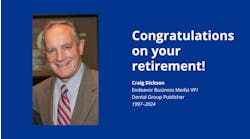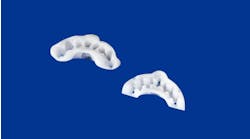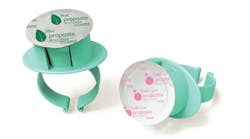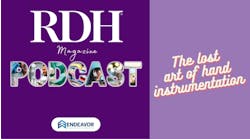by Anne Nugent Guignon, RDH, MPH
Dental hygienists are very smart. Most of us are hard workers who are devoted to our profession. Our academic preparation focuses on providing patient care, and most of us graduate ill prepared to deal with the realities of business and finance. This lack of education can lead to some big disappointments in the real world. We need to understand how our careers fit into the big picture financially in order to realistically plan for our futures.
Many hygienists enjoy careers that span two or three decades. Over the years, I have learned some successful ways to maintain a healthy, financially rewarding career. It is possible to keep your career on an even keel despite life’s challenges and unexpected events. Approaching your career in a business-like manner can prevent countless hours of frustration, pain, and dollars spent on fixing a broken body or spirit.
Many hygienists are part-time employees in their practices. Most part-time positions do not have the luxury of a benefits package, even if the position is permanent. Often the focus is on the daily, monthly or hourly pay rate. As a result, many hygienists are responsible for covering their own retirement fund, continuing education and uniforms. In addition, part time positions rarely receive holiday or vacation pay.
A compensation package that includes benefits is worth a lot more dollars than a simple paycheck. To determine your actual wage, calculate how many out-of-pocket dollars it costs to provide these perks. In addition, self-funded benefits cost more than the actual purchase price because they are purchased with dollars already subjected to employment taxes.
It is critical to have good disability insurance and a good savings plan. Statistics show there is a 70 percent chance of becoming injured or sick during your career. If an injury or illness makes it impossible to practice, are you financially prepared to be without a paycheck for four to six months? What if an injury or illness ended your clinical career long before you planned to retire? Who would pay the bills? No one ever thinks this will happen, but the sad reality is that financially unprepared hygienists often lose everything, or take years to recover from an unexpected event. It is financial suicide not to protect your most precious asset — your health and ability to produce an income.
There are two types of disability coverage. A group policy, negotiated by a professional organization such as the ADHA, typically has a lower rate than an individual policy, however, waiting periods can be longer. Coverage and other policy details are based on the contract negotiated by the group. Payouts are often low and of short duration. In addition, the actual carrier can change from year to year, resulting in increasing premiums over the life of the policy.
Individual disability policies, customized to fit specific needs, are more costly. Be prepared to have your medical history scrutinized if you apply for an individual policy. Individual policies that do not allow for an increase in premiums are wonderful but increasingly rare.
Before you make a final purchase, understand the fees, waiting period, claims process, and all exclusions and limitations. Never assume that disability coverage will cover 100 percent of your wages for an unlimited time as soon as a claim is filed. Each policy spells out the details. Make sure you understand the fine points.
The old adage that you get what you pay for is particularly true in the world of insurance. Insurance companies are betting that they will not have to pay out claims. It has become increasingly difficult to find a company that will write a disability policy for clinical dental hygienists, because of the increasing numbers of claims filed by members of our profession. As a result, premiums are higher, coverage is more limited and many policies contain numerous exclusions, especially for pre-existing conditions.
Setting up a consistent savings plan is a must. Smart people pay themselves first. By this I mean put a certain amount of money into savings every payday. Fund your retirement account to the max every year. Think of these dollars as untouchable. Don’t consider buying a new car or paying for a vacation or new house with long-term savings. Put some dollars into a short-term savings to cover these types of purchases, or reassess whether you really need to spend your hard earned dollars. Often the urge to buy goes away if you just give it time.
Credit cards are a seductive modern-day convenience that can wreak havoc on the best money management intentions. Financial institutions make billions of dollars on interest rates, late charges and annual fees. While credit cards make purchasing easy, it’s easy to quickly amass an unbelievable amount of debt. If you can’t pay a credit card debt in full every month, consider using a debit card to keep spending habits in line with reality.
Hire a good financial planner and tax consultant. Surround yourself with money-managing experts that can help you preserve what you earn and make your money grow through legitimate tax shelters and wise investments.
For example, many expenses that relate to your professional career are tax deductible if the expenses are not reimbursed and you file a long form at tax time. Valuable deductions are lost every year when hygienists fail to report continuing education expenses, including travel, course fees, books and audio/video tapes. Uniforms, charitable donations and association dues are also deductible. Don’t forget purchases like magnification loupes, instruments, ultrasonic scalers or any other products or supplies. Keep all receipts and maintain accurate records of expenditures to support the deductions.
Sometimes there is confusion about how we can be paid. With very few exceptions, hygienists must be employed by a dentist to practice, meaning we are employees, not independent contractors. Employee wages are subject to income tax withholding and FICA. Employers must make matching FICA contributions.
Some dentists try to claim that we are independent contractors and refuse to pay employee wages. Unless there are other circumstances, the IRS will not pursue a small employer to collect these funds. Even though most hygienists are not independent contractors, we are ultimately responsible for all income tax and FICA payments for any income earned, whether a dentist/employer sends a 1099 form or not. Keep good records and report all income. To be on the safe side, make copies of all checks and wage statements. Never accept cash payments.
Adopt the attitude that your dental hygiene career is yours and yours alone! Your career does not belong to anyone else. You did the studying, put in the hours, jumped through the hoops and cleared all the hurdles to get your license. If you develop ownership of your future you will be much happier in the long run. It is the beginning of a new year, a perfect time to take a good hard look at where you are financially so you can continue to practice in the comfort zone.
About the Author
Anne Nugent Guignon, RDH, MPH, is the senior consulting editor for RDH magazine. She is an international speaker who has published numerous articles and authored several textbook chapters. Her popular programs include ergonomics, patient comfort, burnout, and advanced diagnostics and therapeutics. Recipient of the 2004 Mentor of the Year Award, Anne is an ADHA member and has practiced clinical dental hygiene in Houston since 1971. You can reach her at [email protected] or (832) 971-4540, and her Web site is www.anneguignon.com.





